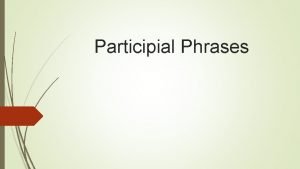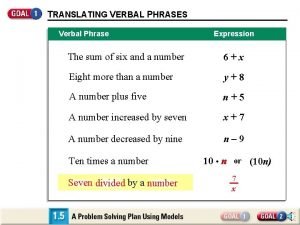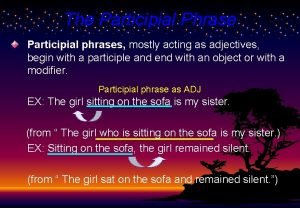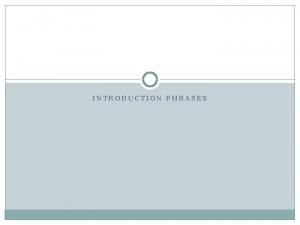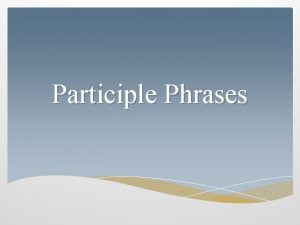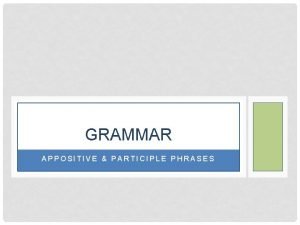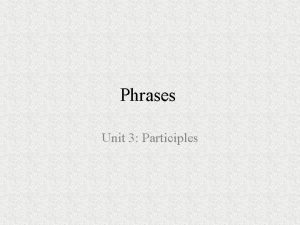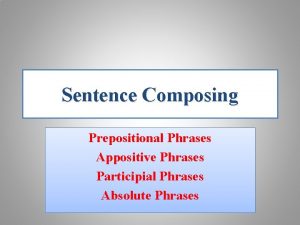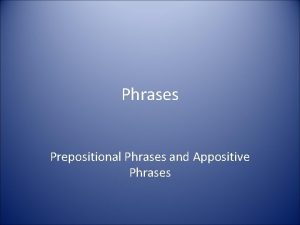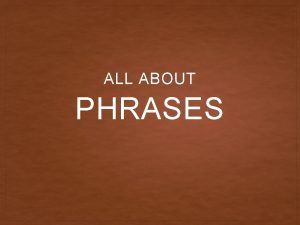Participle phrases Or who did what how Definition








- Slides: 8

Participle phrases Or, who did what how?

Definition and Usage • Definition: a participle phrase is an adjective phrase that starts with a participle • A participle is a form of a verb that is used as an adjective • The burning bush, the fallen trees, the drowning man • An adjective phrase means it is a group of words that describe a noun • Burning in the desert, the bush lit up the night. (What kind of bush was it? A burning one) • The trees, felled by the snow, lay across the train tracks. (Which trees or which kind of trees were they? Ones that had been knocked over by snow) • The man drowning in the river called for help. (Which man was it? The one drowning in the river) • Usage: use to combine sentences and make your writing more complex and descriptive • The fart filled the tiny car. The fart ended their marriage. • Filling the tiny car, the fart ended their marriage. • The fart filled the tiny car, ending their marriage.

Placement options • At the beginning of a sentence: • Breaking over the horizon, the sun blinded the drivers headed east on the freeway • In the middle of a sentence: • The sun, breaking over the horizon, blinded the drivers headed east on the freeway • We need commas here, since the phrase “breaking over the horizon” is non-restrictive (I’ll teach you that later) • The man dressed like Hitler was arrested at the Bernie Sanders rally • We don’t need commas here, since the phrase “dressed like Hitler” is restrictive (I’ll teach you that later) • At the end of a sentence: • The survivors watched the zombies eating brains • No comma is necessary, because the zombies are the ones eating the brains. We wouldn’t think the survivors were eating brains like popcorn whilst watching the zombies shamble about outside the walls of the city. • The survivors watched the zombies, wondering if they were safe. • A comma is necessary, because the participle phrase “wondering if they were safe” is separated from the noun it modifies – “survivors, ” not “zombies. ” The survivors don’t care if the zombies are safe.

How to make them • Step two: Find two sentences with the same noun, each of which has a different verb • The temple shone in the moonlight. The temple soared above the forest floor. • Step two: Eliminate a redundant noun (frequently the subject of the sentence) • The temple shone in the moonlight. The temple soared above the forest floor. • Step three: convert the verb from the sentence with the eliminated noun to a participle form • The temple shone in the moonlight. soaring above the forest floor. • Step four: Put the phrase where you want it and punctuate it appropriately • The temple shone in the moonlight, soaring above the forest floor. • Soaring above the forest floor, the temple shone in the moonlight. • The temple, soaring above the forest floor, shone in the moonlight.

How many options are there, anyway? (plenty) • The student stormed from the room. He cursed out the teacher. Storming from the room, the student cursed out the teacher. The student, storming from the room, cursed out the teacher. The student cursed out the teacher, storming from the room. Cursing out the teacher, the student stormed from the room. The student, cursing out the teacher, stormed from the room. The student stormed from the room, cursing out the teacher.

Which option is right? • Well, that’s up to you. Kind of. You want to pick the one that is the most important to be the independent clause. • Sometimes that’s easy to figure out. Sometimes it’s more difficult. • Easy: Flying out of the night, the bat latched onto the prom queen’s face. • Clearly it’s more important that she was attacked than where the bat came from. • More difficult: • Storming from the room, the student cursed out the teacher. • Cursing out the teacher, the student stormed from the room. • Which is more noteworthy? The cursing out of a teacher or the fact that he stormed out of the room?

Now you try (part 1) • Umkulthoum looked through her purse for money. She told the cashier to ring up the machete. • 1. • 2. • 3. • 4. • 5. • 6.

Now you try some more (part 2) • Write your own to original simple sentences, and then combine them in all six ways possible (not every two simple sentences will work, so pick yours carefully. • EX: • 1 • 2 • 3 • 4 • 5 • 6
